Library Research Guides
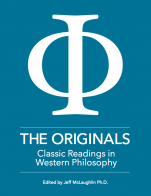 The Originals: Classic Readings in Western Philosophy by Jeff McLaughlin (2019): BC Campus.
The Originals: Classic Readings in Western Philosophy by Jeff McLaughlin (2019): BC Campus.
It is important for students not only to get an appreciation and understanding of philosophy but also to be exposed to the very words and ideas of those who have shaped our thinking over the centuries. Accordingly, the title of this collection hints at the facts that these readings are from the original sources and that these philosophers were the originators of many of the issues we still discuss today. Major areas of philosophy covered here are: Ethics, Epistemology, Metaphysics, Philosophy of Religion, Ethics, Socio-Political Philosophy, and finally, Aesthetics.
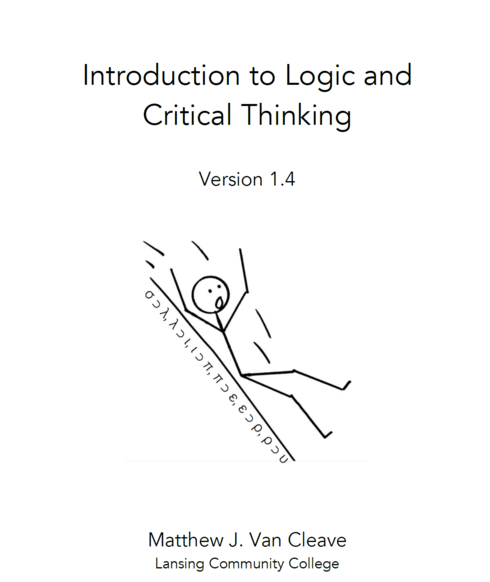 Introduction to Logic and Critical Thinking by Matthew Van Cleave (2016): Matthew J. Van Cleave
Introduction to Logic and Critical Thinking by Matthew Van Cleave (2016): Matthew J. Van Cleave
This is an introductory textbook in logic and critical thinking. The goal of the textbook is to provide the reader with a set of tools and skills that will enable them to identify and evaluate arguments. The book is intended for an introductory course that covers both formal and informal logic. As such, it is not a formal logic textbook, but is closer to what one would find marketed as a “critical thinking textbook.”
 An Introduction to Reasoning by Cathal Woods (2019): Cathal Woods
An Introduction to Reasoning by Cathal Woods (2019): Cathal Woods
An Introduction To Reasoning is a set of three books (Real-World Reasoning, Propositional & Categorical Reasoning, and Inductive & Scientific Reasoning), each of which contains material sufficient for a 15-week term. Instructors can not only assign only one of these books, but individual chapters (and these can be further customized by the instructor in the sense that they can be edited by the instructor).
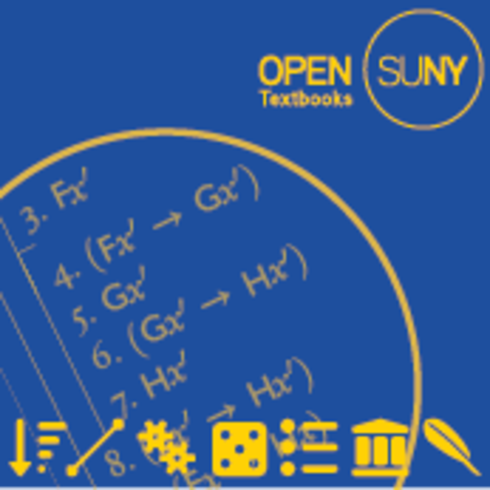 A Concise Introduction to Logic by Craig DeLancey (2017): Open SUNY
A Concise Introduction to Logic by Craig DeLancey (2017): Open SUNY
A Concise Introduction to Logic is an introduction to formal logic suitable for undergraduates taking a general education course in logic or critical thinking, and is accessible and useful to any interested in gaining a basic understanding of logic. This text takes the unique approach of teaching logic through intellectual history; the author uses examples from important and celebrated arguments in philosophy to illustrate logical principles. The text also includes a basic introduction to findings of advanced logic. As indicators of where the student could go next with logic, the book closes with an overview of advanced topics, such as the axiomatic method, set theory, Peano arithmetic, and modal logic. Throughout, the text uses brief, concise chapters that readers will find easy to read and to review.
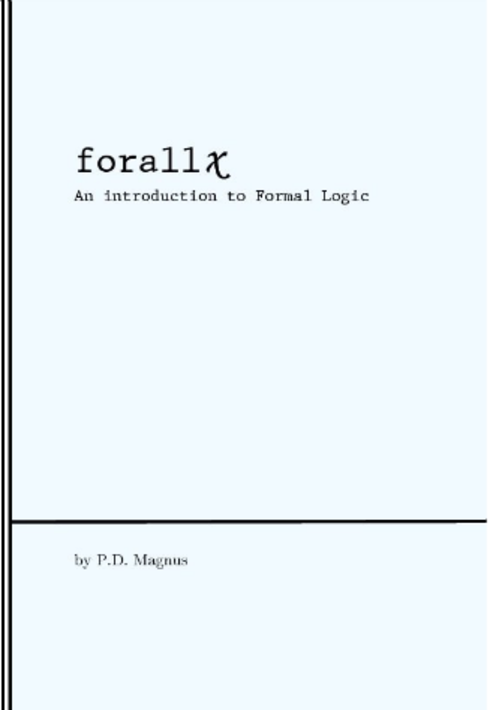 An Introduction to Formal Logic (Forall x) by P.D. Magnus (2012): Fecundity
An Introduction to Formal Logic (Forall x) by P.D. Magnus (2012): Fecundity
This text is an introduction to sentential logic and first-order predicate logic with identity, logical systems that significantly influenced twentieth-century analytic philosophy. After working through the material in this book, a student should be able to understand most quantified expressions that arise in their philosophical reading.
This books treats symbolization, formal semantics, and proof theory for each language. The discussion of formal semantics is more direct than in many introductory texts. Although forall x does not contain proofs of soundness and completeness, it lays the groundwork for understanding why these are things that need to be proven.
 Open Logic Project by Richard Zach et al (2016): Open Logic Text
Open Logic Project by Richard Zach et al (2016): Open Logic Text
The Open Logic Text is an open-source, collaborative textbook of formal meta-logic and formal methods, starting at an intermediate level (i.e., after an introductory formal logic course). Though aimed at a non-mathematical audience (in particular, students of philosophy and computer science), it is rigorous.
 Critical Thinking: Analysis and Evaluation of Argument v. 2 by Martha Bailey et al (2019): Portland Community College
Critical Thinking: Analysis and Evaluation of Argument v. 2 by Martha Bailey et al (2019): Portland Community College
This text is intended for classes offered in the discipline of Philosophy, as it has developed within the European intellectual tradition. Critical Thinking classes in Philosophy evolved from the 1970s onward, slowly morphing from classes in formal or symbolic logic to new classes in applied symbolic logic. Applied logic gave way to Informal Logic classes, and from there to Critical Thinking. In the Philosophy tradition, critical thinking still uses the vocabulary and techniques from logic proper. Some of this vocabulary is shared with other disciplines in Higher Education – especially Argumentative Writing (in Composition or Rhetoric departments) and Speech or Debate classes (From Communication.) But the common vocabulary can mask underlying differences in emphasis. Critical Thinking in the tradition of logic is focused less on persuading, and more on reliability of thinking.
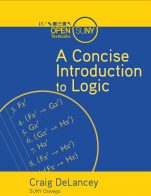 A Concise Introduction to Logic by Craig DeLancey (2017): SUNY Oswego
A Concise Introduction to Logic by Craig DeLancey (2017): SUNY Oswego
A Concise Introduction to Logic is an introduction to formal logic suitable for undergraduates taking a general education course in logic or critical thinking, it and is accessible and useful to any interested in gaining a basic understanding of logic. This text takes the unique approach of teaching logic through intellectual history; the author uses examples from important and celebrated arguments in philosophy to illustrate logical principles. The text also includes a basic introduction to findings of advanced logic. As indicators of where the student could go next with logic, the book closes with an overview of advanced topics, such as the axiomatic method, set theory, Peano arithmetic, and modal logic. Throughout, the text uses brief, concise chapters that readers will find easy to read and to review.
 Introduction to Philosophy by Dr. Philip A. Pecorino (2001): CUNY
Introduction to Philosophy by Dr. Philip A. Pecorino (2001): CUNY
Most people who take a college course in Philosophy do so without having had another. Most will take only one and many of them do so primarily to satisfy some degree requirement. Indeed, many students in a college Philosophy course are only interested in finishing the course in order to get their credits and those credits are to satisfy a degree requirement. The degree is desired as a means to some other end: transfer to a four-year college, a job, different job or promotion. Be that as it may, this text is designed to stimulate your mind. Whether you read it because it is required or whether you are really interested in the subject matter, there will be plenty in this study of Philosophy to interest you, entertain your mind, challenge you and frustrate you as well.
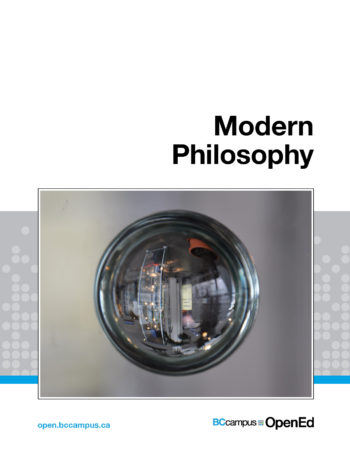 Modern Philosophy by Walter Ott and Alex Dunn (2015): BCCampus
Modern Philosophy by Walter Ott and Alex Dunn (2015): BCCampus
This is a textbook (or better, a workbook) in modern philosophy. It combines readings from primary sources with two pedagogical tools. Paragraphs in italics introduce figures and texts. Numbered study questions (also in italics) ask students to reconstruct an argument or position from the text, or draw connections among the readings. The introductory chapter, Minilogic and Glossary, are designed to present the basic tools of philosophy and sketch some principles and positions.
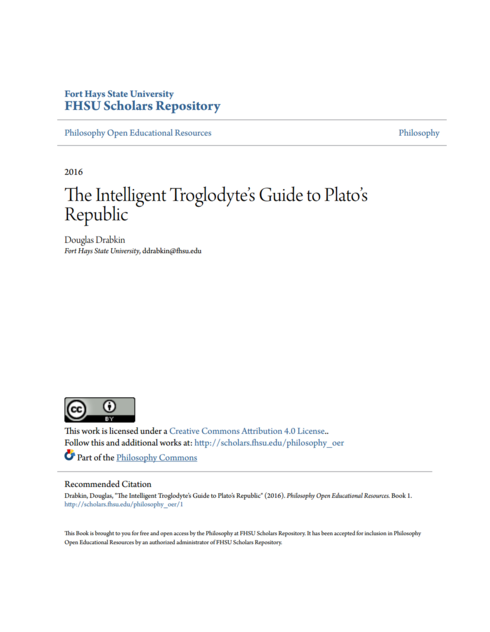 The Intelligent Troglodyte’s Guide to Plato’s Republic by Douglas Drabkin (2016): Fort Hays State University
The Intelligent Troglodyte’s Guide to Plato’s Republic by Douglas Drabkin (2016): Fort Hays State University
The Republic of Plato is one of the classic gateway texts into the study and practice of philosophy, and it is just the sort of book that has been able to arrest and redirect lives. How it has been able to do this, and whether or not it will be able to do this in your own case, is something you can only discover for yourself. The present guidebook aims to help a person get fairly deep, fairly quickly, into the project. It divides the dialogue into 96 sections and provides commentary on each section as well as questions for reflection and exploration. It is organized with a table of contents and is stitched together with a system of navigating bookmarks. Links to external sites such as the Perseus Classical Library are used throughout. This book is suitable for college courses or independent study.






Animals & Ethics 101 (Nathan Nobis, Wordpress)
Causal & Statistical Reasoning (Open Learning Initiative)
Diagramming Arguments (Lander University)
Free Philosophy Texts (NGE Far Press)
Ideologies of Lived Space (University of Amsterdam)
Inferring & Explaining (PDX Open Scholar)
Intro Philosophy (University of Edinburgh/YouTube)
Logic & Proofs (Open Learning Initiative)
MIT Philosophy Course List (MIT OpenCourseWare)
Oxford Philosophy Podcast (Oxford University)
PhilPapers (philpapers.org)
Philosophy Bookshelf (LibreTexts)
Words of Wisdom (PressBooks)
Research Guides by Egan Library | University of Alaska Southeast are licensed under CC BY-SA 4.0